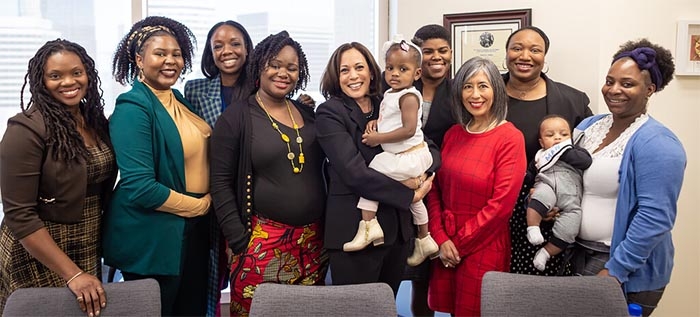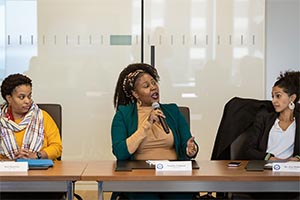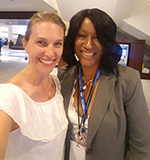
In February, U.S. Senator Kamala D. Harris (D-CA) held a roundtable discussion (02.18.2020) in partnership with the California Breastfeeding Coalition in San Francisco to discuss the Black maternal mortality crisis and her legislation to address persistent biases and shortcomings in our nation’s medical system. Also present at the roundtable was California Surgeon General Dr. Nadine Burke Harris and moderator Devona Robertson, Chair of the California Breastfeeding Coalition along with a host of health providers, community members and maternal care advocates. Chief Editor of THE HUB Magazine & Founder of Sacculturalhub.com, Pleshette Robertson was in attendance and had the opportunity to briefly interview Senator Kamala Harris – click here for the interview. To see all photos from the roundtable event click here.
“During Black History Month, it is important that we not only celebrate the rich legacy of Black Americans, but also acknowledge the historic struggles within the community – many of which persist today,” said Sen. Harris. “Even as advancements in medicine improve outcomes, Black women continue to face a maternal mortality crisis. Every day that we fail to confront racial disparities and injustices in America, we are failing our families and future generations.”
“In our struggle, we need to remind ourselves that we are not alone,” urged Senator Harris. “When we are talking about black maternal mortality, we are talking about the fact that black women die at three to four times the rate of other women in America in connection with childbirth.” The issue has two parts: racial bias and unique stressors that black women in America face: housing, pay and childcare inequity. This is not just about bias among medical health professionals, but also bias in every system that exists. These various issues, when combined, contribute to the mortality rate of black women.
Senator Harris is authoring the Maternal Care Access and Reducing Emergencies (Maternal CARE) Act (reintroduced in May 2019). The act has three elements to it:
- A $25 million grant to support medical, nursing, other training schools to implement training on implicit and explicit racial bias;
- A $125 million pregnancy medical home pilot project to help states develop integrated care;
- And directs the national academy of medicine to study and make recommendations to incorporate bias recognition in clinical skills testing for medical schools.
Senator Harris explains, “it hurts when you are not taken seriously. Especially when you know your facts, when people don’t believe you and you have to prove what you know instead of people just taking you at your word. It’s at the core of a system that is corrupt frankly.” The community professes to be about caring for people, making them whole, and giving them care, and yet it conducts itself in quite the opposite way, which is to suggest they are not whole and undeserving of care.
Surgeon General Burke Harris shared, “just like our broader American society, our healthcare system is built on a history of racism and oppression. We can’t separate that.“ The main reason that hospitals desegregated was due to the passage of the 1965 Medicare/Medicaid Act, which required medical facilities receiving federal dollars to integrate. What needs to happen in America today is to change hearts. Burke Harris believes the best way to do this is to change policy. “We can change policy, we can change requirements, and that changes outcomes, and hearts and minds change as a result of the different outcomes.”
 |
| Photo: Office of U.S. Senator Kamala Harris |
At the roundtable, many maternal health providers, advocates, and mothers shared their stories and how they are contributing to improve maternal care and mortality in California:
After challenges with two of her four pregnancies, Brandi, a lactation consultant at West Oakland Health Center, made it her personal mission to make it known about the health disparities of black women and children, and teaching self-advocacy.
As she grew in knowledge through each pregnancy, she still experienced mistreatment.
“It’s so interesting that you can know so much and you can know who you are as a person, and as soon as someone comes in with more power and authority, that you think – they are a doctor in a white coat – how they can change you.”
She felt pressured in how to care for her baby that were contrary to her beliefs and her knowledge, and it was difficult to stand up for herself. Through her experiences, she is motivated to equip black mothers with knowledge so they may be confident and better able to speak up and advocate for themselves and their babies.
Another lactation consultant remarked that when she started in her hospital she was the first black lactation consultant. She had to prove her knowledge; pediatricians did not trust her judgment at first. She shared, “we should not have to roll out our resumes or our credentials when we walk into a doctor’s office, clinic or hospital.”
Programs mentioned that will undoubtedly play a major part in educating as well as assisting Black mothers that include:
- San Francisco Collective Impact program, Expecting Justice, has created the Racial Equity 101 Toolkit, A Series of Tools to Advance Racial Equity in the Workplace.
- Legislation – California Doula Medi-Cal bill AB-2258 | Allowing Medicaid to cover doula services will improve outcomes for pregnant women and reduce costs. Under the bill, services from a trained, qualified doula would be eligible for coverage through private insurance and Medicaid, including the state medical assistance program, for up to $1,500 per pregnancy. The bill, which would take effect July 1, 2020, would also set industry standards and create a statewide registry of doulas.
- The Black Child Legacy Campaign has established a statewide expansion projects for maternal and infant health focus on the areas of: Black mothers digital media storytelling project, Birthing While Black documentary, and community listening sessions and forums.
- Equality and equity are NOT the same thing. What works for black women is different than other races. Highland Hospital is developing a model for prenatal care developed by and for black women – black doctors, midwives, social workers, nutritionists, lactation consultants. It is imperative to offer black families a program that is geared towards them.
- Supporting Our Ladies And Reducing Stress (SOLARS) to prevent preterm birth is one of the first, large-scale studies, designed by women of color, to help us understand the impact of stress, anxiety, and racism in addition to resilience and coping – on preterm birth.
In summary, we need to do more than just raise awareness. We need to have accountability and training for our medical professionals on the specific needs of the black community. It should be enough that black women and babies are dying.
The Black Maternal Health Momnibus Act of 2020, was just introduced last month (March 2020) by U.S. Representatives Lauren Underwood (D-IL) and Alma Adams (D-NC), U.S. Senator Kamala Harris (D-CA), and members of the Black Maternal Health Caucus. The bill addresses the racial disparities in pregnancy outcomes among Black women in America, including higher rates of death and severe morbidity.
The 3rd annual national Black Maternal Health Week (BMHW) campaign, founded and led by the Black Mamas Matter Alliance, will be a week (April 11-17, 2020) of awareness, activism, and community building intended to: deepen the national conversation about Black maternal health in the US; amplify community-driven policy, research, and care solutions. Activities during BMHW are rooted in human rights, reproductive justice, and birth justice frameworks.






